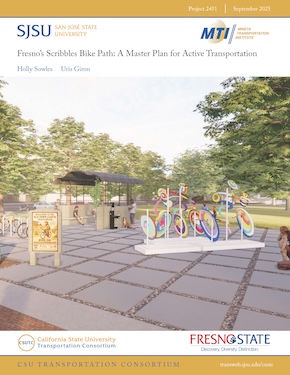- 408-924-7560
- mineta-institute@sjsu.edu
- Donate
Fresno’s Scribbles Bike Path: A Master Plan for Active Transportation
The Fresno Scribbles Bike Path Master Plan, which represents a commitment to equitable active transportation and social infrastructure, is designed to enhance the quality of life for Fresno residents by providing safe, comfortable, and accessible biking and walking paths while promoting sustainability and fostering a sense of community. This report details the Intelligent Design Visualization Lab’s (IDVL) ongoing contribution to the Fresno City Scribbles Bike Campus initiative. This multifaceted urban intervention seeks to promote bike and pedestrian safety, enhance environmental resilience, and active transportation infrastructure through design, serving as a form of placemaking. In collaboration with the Fresno State Transportation Institute(FSTI) and in alignment with the Fresno County Regional Active Transportation Plan (FATP), the project focuses on two critical deliverables: the design development of eight educationally themed, district-specific bike shelters and the creation of a heat island mitigation design toolkit (which aims to reduce the impact of “heat islands” in which urban areas become significantly warmer than surrounding rural areas due to human activities and built environment), known as the Heat Island Design Toolkit(HIDT). Both efforts are grounded in health, safety, and well-being principles, as well as democratized design, environmental equity, social justice, and spatial agency. The gateway trailhead bike shelters are designed as contextual and functional complements to the cultural and architectural vernacular (styles) of the eight districts in the greater Fresno area. They are intended to support year-round use of the biking infrastructure by integrating amenities such as shade structures, charging stations, water access, and repair services. Parallel to this, the Heat Island Toolkit investigates and prototypes scalable strategies to reduce surface temperatures at gateway trailheads and along bike pathways. The mitigation strategies include community surveys, site-specific analysis, 3D renderings, and flythroughs of the sites. The master plan proposes a participatory framework that prioritizes distributed decision-making by engaging district residents through both in-person touchpoint stations and asynchronous digital tools for feedback. Findings from early survey data indicate district-level variation is preferred in heat mitigation design strategies, underscoring the need for localized design informed by community engagement. Ultimately, the initiative advances a public social infrastructure model highlighting safety, health and wellness, climate adaptation, and inclusive design processes. By merging technological exploration with grassroots engagement, the IDVL proposes an ecologically responsive, resilient, and socially oriented archetype for active transportation design in California’s Central Valley. These efforts promote bike and pedestrian use and safe, inclusive, equitable, and environmentally sound mobility.
Holly Sowles
Professor Holly Sowles is an innovative and future-focused designer and educator whose work explores the intersection of interior design, emerging technologies, and human experience. Her research explores how ambient environments, cyber-physical systems, and intelligent frameworks can transform the way interiors are conceived and experienced. She has proposed new models for integrating experiential typologies into design thinking through her scholarship, reflecting a critical shift from 20th-century to 21st-century approaches.
As an Associate Professor of Interior Design and Chair of the School of Art, Design, and Art History at California State University, Fresno, Holly leads transdisciplinary initiatives that bridge theory, practice, and emerging technologies. She is passionate about preparing the next generation of designers to engage with the evolving landscape of the built environment, emphasizing interdisciplinary thinking, sustainability, and intelligent design practices.
Uris Giron
Professor Uris Giron is an inquisitive and committed designer who uses interior design as a tool for storytelling, empowerment, and transformation. With deep roots in community-based work and participatory design, Uris approaches every project with empathy, imagination, and a collaborative spirit. His work spans healthcare innovation to educational environments, and campus masterplans to culturally driven community spaces, all reflecting a dedication to making people feel safe, comfortable, and inspired.
Born in Los Angeles and shaped by early experiences with organizations such as MoLE, the Intel Computer Clubhouse, and RCDI, Uris developed a lifelong passion for art, technology, and civic engagement. His formative years led him to pursue design not only as a craft but as a social force for good. He continues to uphold this ethos today as an Assistant Professor of Interior Design at California State University, Fresno, where he mentors emerging designers and leads projectscentered on equity, sustainability, and resilience.
Uris’ professional experience includes design and project management roles at leading firms such as NBBJ and Perkins+Will, where he contributed to nationally recognized healthcare and institutional projects. His research in “Democratizing Design” explores participatory methods for engaging communities directly in the design process, an approach he tested with the revitalization of St. Ignatius Hospital in Colfax, WA.
-
Contact Us
San José State University One Washington Square, San Jose, CA 95192 Phone: 408-924-7560 Email: mineta-institute@sjsu.edu






